|
You need to write a biography, a story of someone’s life. What do you do to discover the person’s silly quirks or darkest secrets? Probably you go online. That’s a good start, but that’s all it is—a start. Real authors—and students completing assignments—dig deeper. Only by checking a variety of resources can you find the juiciest facts to make your biographies come alive. For example, when I write about someone, I start by reading an overview of their life. I might check a general resource, such as Wikipedia, But not all information is accurate in this or other websites, so I play detective to locate resources that confirm what I’m reading. One way to find good resources is to look at the bottom of the Wikipedia article and see which articles and books that author used as resources. If these sources seem credible to you, click to find the original articles the author used. Another source of information is your librarian. Librarians love to delve into the craziest topics. Need to locate a long-lost relative of your biography subject or trail where that person lived over the years, ask your librarian. Librarians locate books, specialized online resources, and newspapers and magazines that can help you. When I researched Dolores Huerta Stands Strong: The Woman Who Demanded Justice, I wanted more personal resources. So I looked for people to interview who knew her at different times of her life. I called up volunteers who marched with Dolores to protest unfair treatment of farm workers. I found others who helped the public learn not to eat table grapes until farm owners agreed to pay farm workers fair wages and provide clean housing, breaks in the fields, and places to go to the bathroom. When I wanted to learn how Dolores Huerta worked to improve lives of women, I contacted Gloria Steinem, a leader of the 1970s women’s movement. I talked with Huerta’s children. I prepared before each interview. I learned about connections between the interviewees and my biography subject. I wrote questions ahead of time, so I wasn’t wasting interviewee time. At the end of each interview, I asked: “Is there something else you remember?’ That’s when I got some of the best stories. Between interviews, books, magazine and newspaper articles, I found enough material to tell Huerta’s life. You can with your biography, too. 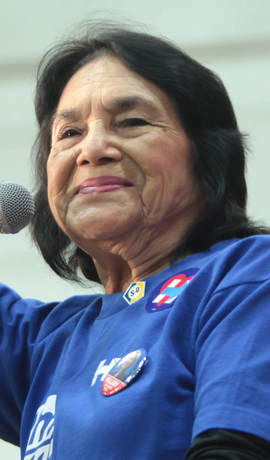 Once you've researched and written your biography, you will probably want to add a picture of your subject. You've probably seen many pictures during your research, but you must be careful about permission to use photographs or drawings. You can find some good guidelines at How to Find Free Images With Google's Advanced Image Search. This photo of Delores Huerta is from her Wikipedia article. Most photos from Wikipedia may be used for non business purposes. By clicking on a picture, you are taken to Wikimedia, the place where photos reside. You will be able to download a photo and decide how you want to caption it. Here's what it says about this photo in Wikimedia: Description English: Dolores speaking at an event in Phoenix, Arizona. Date: 20 March 2016 Author: Gage Skidmore This information will allow you to tell your reader about the photo in the form of a caption and also credit your source: Delores Huerta speaking at an event in Phoenix Arizona on March 20, 1916. Photo by Gage Skidmore via Wikimedia 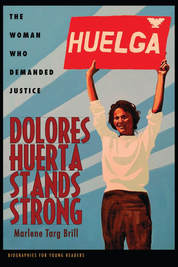 Marlene Targ Brill's Dolores Huerta Stands Strong follows Huerta’s life from the mining communities of the Southwest where her father toiled, to the vineyards and fields of California, and across the country to the present day. As she worked for fair treatment for others, Dolores earned the nation’s highest honors. More important, she found her voice.
1 Comment
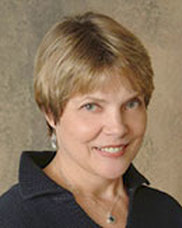 If you yearn and burn to be a writer, how can you make that a reality? From the time I was a teenager, I wanted writing to be my life’s work. But even though I loved to write, how to become a writer stumped me. I thought education must be the answer and had master’s degrees in both English and journalism before I realized that the only one who could harness and develop my inner writer—my writing soul—was me. Like most writers before me, I had to mostly teach myself what I needed to know. I have since published hundreds of articles and a dozen books. While writing a book about Charles Dickens, I was surprised to learn that even he—one of the greatest writers of all—also had to teach himself. Because of family circumstances, he had only two years of formal schooling, so he learned the fine points of grammar and style on his own. Beginning at age fifteen, he worked upward through a series of jobs until, based solely on his writing ability, he became a newspaper reporter. In his spare time he wrote stories, articles, sketches, essays, editorials, theatre reviews, and plays. Gradually he began getting published in a monthly magazine. It didn’t pay him, but he was honing his craft, finding and training his voice as a writer. Then a publisher who liked his magazine stories gave him the opportunity to write his first novel—and the rest is history. My advice to you is Dickens’ advice to you: don’t wait for someone to give you permission to be a writer or to teach you how. Give yourself permission. Teach yourself. Just write. Do it every day. Write about what you see, what you feel, what you dream. Make up stories. Observe people closely: what they wear, how they speak, what they do, how they feel and why. Learn how to write articles and essays. Study your favorite authors and pattern your work after theirs. Don’t worry that you are mimicking them, for you will find your own style. Trust me on this. Draw from the wisdom and skill of writers who have gone before you, because everything you need to know, you can learn from them. When you’re ready, publication will follow. Read, read, read. Write, write, write. If you want to become a writer, start now. Be a writer. Charles Dickens at age 37 (c) Andrea Warren 2014 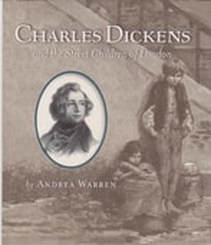 Andrea Warren often teaches writing classes, and she often talks about Charles Dickens and how writing ultimately comes down to teaching yourself. Warren talks more about the writing process on her website, And to learn more about Charles Dickens and his quest to become a writer, check out her book, "Charles Dickens and the Street Children of London." Andrea Warren is also a member of Authors on Call. Bring her into your classroom via interactive video conferencing. Here’s where you can learn more about her and her programs. MLA 8 Citation Warren, Andrea. "How Do You Become a Writer? Ask Charles Dickens." Nonfiction Minute, iNK Think Tank, 21 Sept. 2017, www.nonfictionminute.org/the-nonfiction-minute/how-do-you-become-a-writer-ask-charles-dickens. 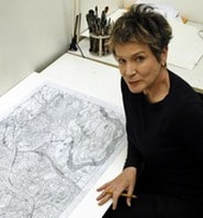 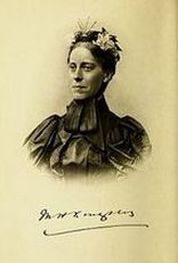 “It is at these times you realize the blessing of a good, thick skirt,” said Mary Kingsley after she crashed into a cleverly concealed leopard pit lined with twelve-inch ivory spikes. The year was 1895, the place Equatorial West Africa, and the spunky lady saved, thanks to her observance to the dress code of the day, was a young Englishwoman collecting species of fish and beetles for the British Museum. Mary Kingsley was the daughter of a physician who spent most of his time traveling. Although she received no formal education (reserved for her brother Charles), Mary learned to read, becoming fascinated with subjects such as science, exploration and piracy. At one point she was granted permission to teach herself German, but only after she could iron a shirt properly. Mary learned chemistry, experimented with gunpowder and electricity, and became engrossed by the intricacies of plumbing. After years of caring for her invalid mother, in 1892 both her parents died. With the small inheritance left to her came the fulfillment of a dream: to explore West Africa. When Mary crashed into the leopard pit, she was traveling in what was then the French Congo, getting to know the Fangs, reportedly a tribe of cannibals. Traveling by canoe, she was once marooned in a crocodile-infested lagoon. When one tried to climb aboard, she was there with a paddle, ready to “fetch him a clip on the snout.” After two trips, she wrote a book called Travels in West Africa. She became a sought-after lecturer and celebrity. In public appearances she was both funny and serious, peppering her narrative with jokes, often at her own expense, but also being critical of the way the British had steamrolled into the African continent, with little regard for its ancient cultures. In 1900 she sailed to Africa for the third time, responding to an urgent call for nurses in South Africa, where war was underway. Assigned to a hospital where hundreds of soldiers were dying from a raging epidemic, she became ill herself, and died two months later. She was buried at sea with military honor. In her book, she remembers: “Indeed, much as I have enjoyed life in Africa, I do not think I ever enjoyed it to the full as I did when dropping down the Rembwe… Ah me! Give me a West African river and a canoe for sheer pleasure.” 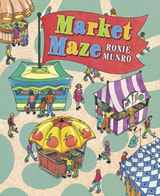 Rave reviews for Roxie Munro's book Market Maze: "A great way to introduce kids to their foods' origins and to prepare them for a greenmarket visit of their own." Kirkus (Starred review!) excerpt. "From a parent’s or teacher’s point of view, here’s a good way for kids to gain the visual discrimination skills needed for reading, while they learn about the sources of food at their local farmers’ markets. For kids, though, the combination of mazes and hidden objects is just plain fun. It’s a winning combination." Booklist review excerpt. Roxie Munro is a member of iNK's Authors on Call so you can meet her face-to-race through interactive videoconferencing. Learn more about her programs here. MLA 8 Citation
Munro, Roxie. "Mary Kingsley." Nonfiction Minute, iNK Think Tank, 15 Mar. 2018, www.nonfictionminute.org/the-nonfiction-minute/Mary-Kingsley. 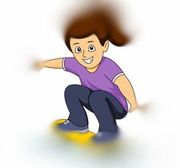 Have you ever been asked to revise something that you wrote, but had trouble doing it? Maybe you didn’t know where to start? Maybe you thought you might actually make it worse than before? Maybe you thought it would be too hard? Believe me, I get it. When I sit down to revise, I am often filled with fears about doing it. Over the years, though, I’ve come up with three simple steps that help take the fear out of revision. Let’s see how to use them when revising the most important chunk of writing—the paragraph. When I revise a paragraph, my first step is to ask myself is “What’s this paragraph about?” Usually, I’ve already written a sentence that tells me. It’s called a thesis sentence. A thesis sentence can be something kind of loose such as “Skateboards rock,” or it can be specific such as “Yesterday, I had my best skateboard ride ever.” The point is that this sentence tells me what the rest of my paragraph needs to be about. When revising, I find it helpful to underline my thesis sentence. Step Two is to make sure that my paragraph makes sense. Here, I check that every sentence helps prove or explain why my thesis sentence is true. I also make sure that none of my sentences are confusing. If they are, I revise them so they are easier to understand. I especially look for sentences that don’t really say anything, such as “Skateboards are, like, the best.” I’d either delete this sentence, or improve it to something like, “Skateboards provide great exercise.” After my paragraph makes sense, I move on to Step Three: making my paragraph more fun. I replace boring verbs with more exciting ones. Instead of saying “My skateboard was fast,” I might write, “My skateboard hurtled down the ramp.” I put in better descriptions. I also might crack a joke, or throw in a simile such as “My skateboard carried me like a four-wheeled chariot”—or a metaphor, “My board launched me into the stratosphere.” When tackling revision, I recommend having someone else read your writing aloud. That helps you spot problems. Even so, I don’t always nail a revision the first—or even the tenth—time. I revised this nonfiction minute more than a dozen times! The important thing is to not let your fears overwhelm you. Remember that revision is simply the process of you saying what you want to say. 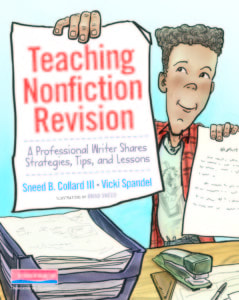 What happens when a bestselling nonfiction children's book author pairs up with a nationally known writing teacher to discuss revision strategies? Magic. Sneed B. Collard III and Vicki Spandel blow the roof off everything you thought you knew about teaching nonfiction writing and the purposes for revision. Dozens of strategy lessons pulled from Sneed's professional writing experience followed by Vicki's classroom-savvy tips and exercises give you the nuts and bolts of teaching revision to make nonfiction writing more meaningful, useful, and enjoyable for the reader. Using a "big-to-small" process of revision, from Big Picture ideas down to individual words, Sneed and Vicki demystify revision and help students become clear, persuasive, compelling-even entertaining-writers. "With your encouragement and guidance," they write, "students will discover the joy of turning their first rough ideas into something readers cannot put down." MLA 8 Citation
Collard, Sneed B., III. "Taking the Fear Out of Revision." Nonfiction Minute, iNK Think Tank, 30 May 2018, www.nonfictionminute.org/the-nonfiction-minute/ Taking-the-Fear-Out-of-Revision. |
*NEWS
|
For Vicki Cobb's BLOG (nonfiction book reviews, info on education, more), click here: Vicki's Blog
The NCSS-CBC Notable Social Studies Committee is pleased to inform you
that 30 People Who Changed the World has been selected for Notable Social Studies Trade Books for Young People 2018, a cooperative project of the National Council for the Social Studies (NCSS) & the Children’s Book Council
Categories
All
Abolitionists
Adams Janus
Adaptation
Adaptations
Adkins Jan
Advertising
Aerodynamics
Africa
African American History
African Americans
Africa West
Agriculture
Aircraft
Air Pilots
Air Pressure
Air Travel
Albee Sarah
Alchemy
Alligators
Allusion
American History
American Icons
Amphibians
Amundsen Roald
Anatomy
Ancient
Ancient Cultures
Anderson Marian 1897-1993
Animal Behavior
Animal Experimentation
Animal Intelligence
Animals
Animation
Antarctica
Ants
Apache Indians
Apes
April Fool's Day
Architecture
Argument
Arithmetic
Art
Art Deco
Artists
Arts
Asia
Astronauts
Astronomy
Athletes
Atomic Theory
Audubon Societies
Authors
Autobiography
Automobiles
Aviation
Awards
Bacteria
Baseball
Battuta Ibn
Bears
Beatles
Beavers
Bees
Biodegradation
Biography
Biology
Biomes
Biomimicry
Biplanes
Birds
Black Death
Black History
Blindness
Blizzards
Bombs
Bonaparte Napoleon
Boone Daniel
Botany
Brazil
Bridges
Brill Marlene Targ
Brooklyn Bridge
Brown John
Buffaloes
Building Materials
Butterflies
Caesar
Caesar Julius
Caissons
Calculus
Calendars
Cannibal
Capitals
Caravaggio
Carbon Dioxide
Carnivores
Carson Mary Kay
Cartoons & Comics
Carving (Decorative Arts)
Cascade Range
Castaldo Nancy
Castles
Castrovilla Selene
Cathedrals
Cats
Caves
Celts
Cemeteries
Chemistry
Children's Authors
Child Welfare
China
Choctaw Indians
Christmas
Chronometers
Cicadas
Cinco De Mayo
Ciphers
Circle
Citizenship
Civil Rights
Civil Rights Movements
Civil War
Civil War - US
Climate
Climate Change
Clocks And Watches
Clouds
Cobb Vicki
COBOL (Computer Language)
Code And Cipher Stories
Collard III Sneed B.
Collectors And Collecting
Color
Commerce
Communication
Competition
Compilers
Composers
Computers
Congressional Gold Medal
Consitution
Contests
Contraltos
Coolidge Calvin
Cooling
Corms
Corn
Counterfeiters
Covid-19
Crocodiles
Cryptography
Culture
Darwin Charles
Declaration Of Independence
Decomposition
Decompression Sickness
Deep-sea Animals
Deer
De Medici Catherine
Design
Detectives
Dickens Charles
Disasters
Discrimination
Diseases
Disney Walt
DNA
Dogs
Dollar
Dolphins
Douglass Frederick 1818-1895
Droughts
Dr. Suess
Dunphy Madeleine
Ear
Earth
Earthquakes
Ecology
Economics
Ecosystem
Edison Thomas A
Education
Egypt
Eiffel-gustave-18321923
Eiffel-tower
Einstein-albert
Elephants
Elk
Emancipationproclamation
Endangered Species
Endangered-species
Energy
Engineering
England
Englishlanguage-arts
Entomology
Environmental-protection
Environmental-science
Equinox
Erie-canal
Etymology
Europe
European-history
Evolution
Experiments
Explorers
Explosions
Exports
Extinction
Extinction-biology
Eye
Fairs
Fawkes-guy
Federalgovernment
Film
Fires
Fishes
Flight
Floods
Flowers
Flute
Food
Food-chains
Foodpreservation
Foodsupply
Food-supply
Football
Forceandenergy
Force-and-energy
Forensicscienceandmedicine
Forensic Science And Medicine
Fossils
Foundlings
France
Francoprussian-war
Freedom
Freedomofspeech
French-revolution
Friction
Frogs
Frontier
Frontier-and-pioneer-life
Frozenfoods
Fugitiveslaves
Fultonrobert
Galapagos-islands
Galleys
Gametheory
Gaudi-antoni-18521926
Gender
Generals
Genes
Genetics
Geography
Geology
Geometry
Geysers
Ghosts
Giraffe
Glaciers
Glaucoma
Gliders-aeronautics
Global-warming
Gods-goddesses
Gold-mines-and-mining
Government
Grant-ulysses-s
Grasshoppers
Gravity
Great-britain
Great-depression
Greece
Greek-letters
Greenberg Jan
Hair
Halloween
Handel-george-frederic
Harness Cheryl
Harrison-john-16931776
Health-wellness
Hearing
Hearing-aids
Hearst-william-randolph
Henry-iv-king-of-england
Herbivores
Hip Hop
History
History-19th-century
History-france
History-world
Hitler-adolph
Hoaxes
Holidays
Hollihan Kerrie Logan
Homestead-law
Hopper-grace
Horses
Hot Air Balloons
Hot-air-balloons
Housing
Huguenots
Human Body
Hurricanes
Ice
Icebergs
Illustration
Imagery
Imhotep
Imperialism
Indian-code-talkers
Indonesia
Industrialization
Industrial-revolution
Inquisition
Insects
Insulation
Intelligence
Interstatecommerce
Interviewing
Inventions
Inventors
Irrational-numbers
Irrigation
Islands
Jacksonandrew
Jazz
Jeffersonthomas
Jefferson-thomas
Jemisonmae
Jenkins-steve
Jet-stream
Johnsonlyndonb
Jokes
Journalism
Keeling-charles-d
Kennedyjohnf
Kenya
Kidnapping
Kingmartinlutherjr19291968
Kingmartinlutherjr19291968d6528702d6
Kings-and-rulers
Kings Queens
Kings-queens
Koala
Labor
Labor Policy
Lafayette Marie Joseph Paul Yves Roch Gilbert Du Motier Marquis De 17571834
Landscapes
Languages-and-culture
Law-enforcement
Layfayette
Levers
Levinson Cynthia
Lewis And Clark Expedition (1804-1806)
Lewis Edmonia
Liberty
Lift (Aerodynamics)
Light
Lindbergh Charles
Liszt Franz
Literary Devices
Literature
Lizards
Longitude
Louis XIV King Of France
Lumber
Lunar Calendar
Lynching
Macaws
Madison-dolley
Madison-james
Madison-james
Mammals
Maneta-norman
Maneta-norman
Marathon-greece
Marine-biology
Marine-biology
Marines
Marsupials
Martial-arts
Marx-trish
Mass
Massachusetts-maritime-academy
Mass-media
Mastodons
Mathematics
May-day
Mcclafferty-carla-killough
Mcclafferty-carla-killough
Mckinley-william
Measurement
Mechanics
Media-literacy
Media-literacy
Medicine
Memoir
Memorial-day
Metaphor
Meteorology
Mexico
Mickey-mouse
Microscopy
Middle-west
Migration
Military
Miners
Mississippi
Molasses
Monarchy
Monsters
Montgomery
Montgomery-bus-boycott-19551956
Montgomery-heather-l
Monuments
Moon
Moran-thomas
Morsecode
Morsesamuel
Moss-marissa
Moss-marissa
Motion
Motion-pictures
Mummies
Munro-roxie
Munro-roxie
Musclestrength
Museums
Music
Muslims
Mythologygreek
Nanofibers
Nanotechnology
Nathan-amy
Nathan-amy
Nationalfootballleague
Nationalparksandreserves
Nativeamericans
Native-americans
Native-americans
Naturalhistory
Naturalists
Nature
Nauticalcharts
Nauticalinstruments
Navajoindians
Navigation
Navy
Ncaafootball
Nervoussystem
Newdeal19331939
Newman-aline
Newman-aline
Newton-isaac
New-york-city
Nobelprizewinners
Nomads
Nonfictionnarrative
Nutrition
Nylon
Nymphs-insects
Oaths Of Office
Occupations
Ocean
Ocean-liners
Olympics
Omnivores
Optics
Origami
Origin
Orphans
Ottomanempire
Painters
Painting
Paleontology
Pandemic
Paper-airplanes
Parksrosa19132005
Parrots
Passiveresistance
Patent Dorothy Hinshaw
Peerreview
Penguins
Persistence
Personalnarrative
Personification
Pets
Photography
Physics
Pi
Pigeons
Pilots
Pinkertonallan
Pirates
Plague
Plains
Plainsindians
Planets
Plantbreeding
Plants
Plastics
Poaching
Poetry
Poisons
Poland
Police
Political-parties
Pollen
Pollution
Polo-marco
Populism
Portraits
Predation
Predators
Presidentialmedaloffreedom
Presidents
Prey
Prey-predators
Prey-predators
Prime-meridian
Pringle Laurence
Prohibition
Proteins
Protestandsocialmovements
Protestants
Protestsongs
Punishment
Pyramids
Questioning
Radio
Railroad
Rainforests
Rappaport-doreen
Ratio
Reading
Realism
Recipes
Recycling
Refrigerators
Reich-susanna
Religion
Renaissance
Reproduction
Reptiles
Reservoirs
Rheumatoidarthritis
Rhythm-and-blues-music
Rice
Rivers
Roaringtwenties
Roosevelteleanor
Rooseveltfranklind
Roosevelt-franklin-d
Roosevelt-theodore
Running
Russia
Safety
Sanitation
Schwartz David M
Science
Scientificmethod
Scientists
Scottrobert
Sculpture
Sculpturegardens
Sea-level
Seals
Seals-animals
Secretariesofstate
Secretservice
Seeds
Segregation
Segregationineducation
Sensessensation
September11terroristattacks2001
Seuss
Sextant
Shackletonernest
Shawneeindians
Ships
Shortstories
Silkworms
Simple-machines
Singers
Siy Alexandra
Slavery
Smuggling
Snakes
Socialchange
Social-change
Socialjustice
Social-justice
Socialstudies
Social-studies
Social-studies
Sodhouses
Solarsystem
Sound
Southeast-asia
Soybean
Space Travelers
Spain
Speech
Speed
Spiders
Spies
Spiritualssongs
Sports
Sports-history
Sports-science
Spring
Squirrels
Statue-of-liberty
STEM
Storms
Strategy
Sugar
Sumatra
Summer
Superbowl
Surgery
Survival
Swanson-jennifer
Swinburne Stephen R.
Synthetic-drugs
Taiwan
Tardigrada
Tasmania
Tasmanian Devil
Tasmanian-devil
Technology
Tecumsehshawneechief
Telegraph-wireless
Temperature
Tennis
Terrorism
Thomas Peggy
Thompson Laurie Ann
Time
Titanic
Tombs
Tortoises
Towle Sarah
Transcontinental-flights
Transportation
Travel
Trees
Trung Sisters Rebellion
Tundra
Turnips
Turtles
Typhoons
Underground Railroad
Us-environmental-protection-agency
Us History
Us-history
Ushistoryrevolution
Us History Revolution
Us-history-war-of-1812
Us Presidents
Ussupremecourtlandmarkcases
Vacations
Vaccines
Vangoghvincent
Vegetables
Venom
Vietnam
Viruses
Visual-literacy
Volcanoes
Voting-rghts
War
Warne-kate
Warren Andrea
Washington-dc
Washington George
Water
Water-currents
Wax-figures
Weapons
Weather
Weatherford Carole Boston
Whiting Jim
Wildfires
Winds
Windsor-castle
Wolves
Woman In History
Women
Women Airforce Service Pilots
Women-airforce-service-pilots
Womeninhistory
Women In History
Women-in-science
Women's History
Womens-roles-through-history
Wonder
Woodson-carter-godwin-18751950
World-war-i
World War Ii
World-war-ii
Wright Brothers
Writing
Writing-skills
Wwi
Xrays
Yellowstone-national-park
Zaunders Bo
ArchivesMarch 2021
February 2021
January 2021
December 2020
November 2020
October 2020
September 2020
June 2020
May 2020
April 2020
March 2020
February 2020
January 2020
December 2019
October 2019
September 2019
August 2019
July 2019
May 2019
April 2019
March 2019
February 2019
January 2019
December 2018
November 2018
September 2018
June 2018
May 2018
April 2018
March 2018
February 2018
January 2018
December 2017
November 2017
October 2017
September 2017
March 2017
The NONFICTION MINUTE, Authors on Call, and. the iNK Books & Media Store are divisions of iNK THINK TANK INC.
a 501 (c) (3) nonprofit corporation. To return to the iNK Think Tank landing page click the icon or the link below. :
http://inkthinktank.org/
For more information or support, contact thoughts@inkthinktank.org
For Privacy Policy, go to
Privacy Policy
© COPYRIGHT the Nonfiction Minute 2020.
ALL RIGHTS RESERVED.
This site uses cookies to personalize your experience, analyze site usage, and offer tailored promotions. www.youronlinechoices.eu
Remind me later
Archives
March 2023
February 2023
January 2023
December 2022
November 2022
October 2022
September 2022
June 2022
May 2022
April 2022
March 2022
February 2022
January 2022
December 2021
November 2021
September 2021
April 2021
March 2021
February 2021
November 2020
October 2020
September 2020
June 2020
May 2020
April 2020
March 2020
February 2020
January 2020
October 2019
August 2019
July 2019
May 2019
April 2019
December 2018
September 2018
June 2018
May 2018
March 2018
February 2018
January 2018
December 2017
November 2017
October 2017
September 2017

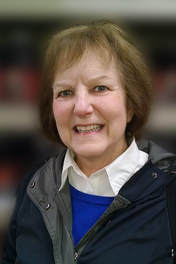

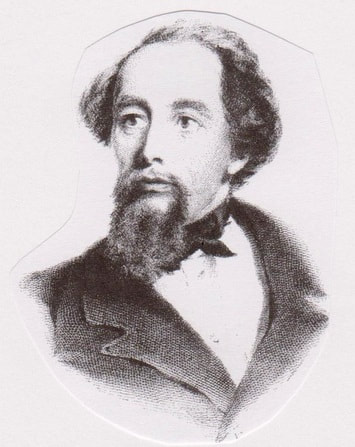


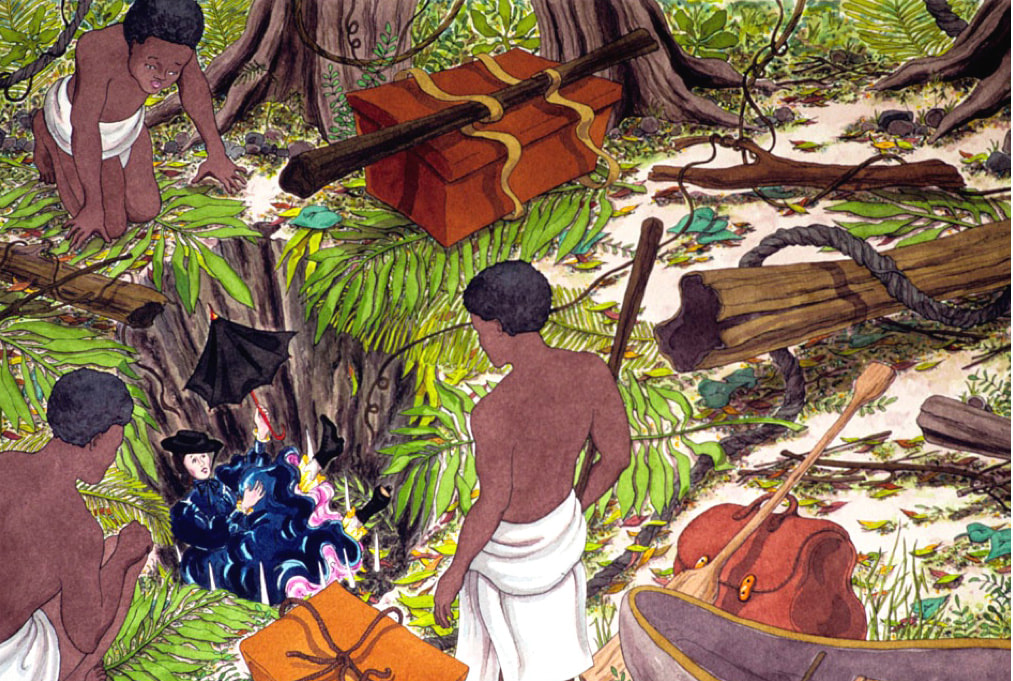
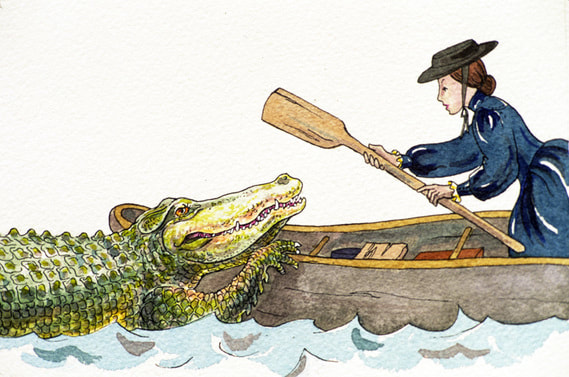
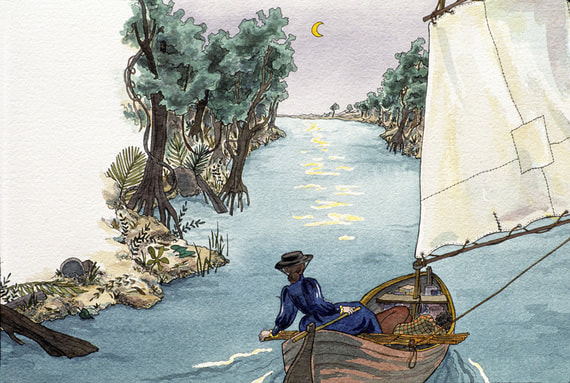



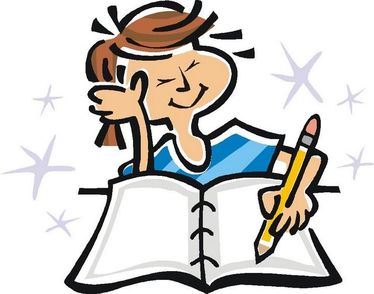

 RSS Feed
RSS Feed
